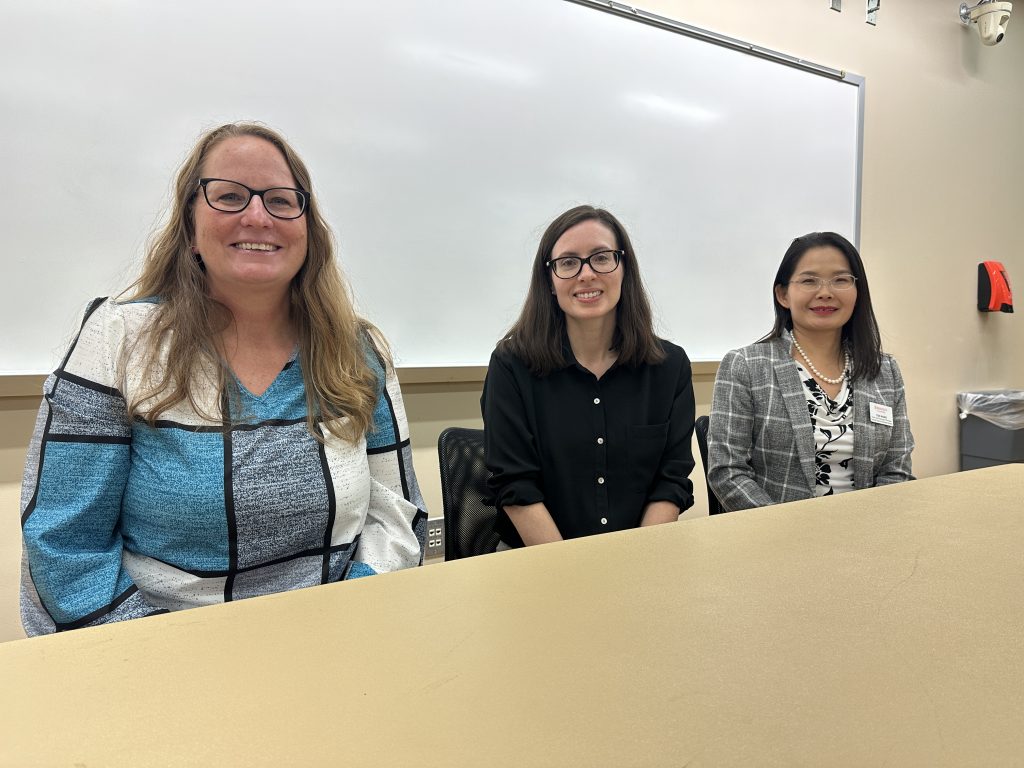Bradley’s chapter of Scientista, the national organization that supports female students in STEM, hosted a panel of three female faculty members on Nov. 8.
The panelists, Yun Wang, Samantha Kirk and Kristy Willis fielded questions from students and spoke about their experiences as women in traditionally male-dominated science, technology, engineering and math fields.
The panel recounted their experiences navigating adversity, discrimination, imposter syndrome, mentorship and also discussed what can be done to make STEM more inclusive.
The first question came from a student who asked, “How does it feel to be a woman in STEM?”
“Awesome,” Bradley alumna and civil engineering and construction associate professor Willis said. “It’s amazing because we bring a whole different perspective to the table.”
While other panelists shared Willis’ excitement about being women in STEM, the conversation shifted to highlight the many challenges that the panelists and students faced as women.
“In grad school, a lot of the women, including me, would feel passed up on. There was research going on in the department, awards being offered and they seemed to … prefer men for those awards,” Kirk, an assistant professor of mathematics, said. “If I had a project, my advisor tended to give better projects to my male counterparts.”
Gender-based discrimination has even affected these professors in their professional lives at Bradley.
“You’ll have times when you have to maybe work twice as hard to get half as much recognition,” Willis said. “I was sitting in a meeting two weeks ago, and I said something, I said, ‘Okay, this is what we’re going to do.’ There was some discussion. And a male counterpart said, ‘Okay, this is what we’re going to do,’ and he literally repeated what I had said … I just simply looked at him, and I said, ‘I believe I just said that, so I didn’t need you to say it again for me.’”
Willis also said the way in which women respond to being minimized plays a big role in making the workplace more equitable and earning the respect of colleagues.
“Sometimes things like that happen, and people don’t even realize they’re doing it, so I think the way you respond is really, really critical to how people respect you,” Willis said.
For many female students, they need to work twice as hard to receive equal recognition from the classroom.
Attendee Oluwaseun Awoseyi, a freshman computer science major, explained that she felt lost in one of her major courses due to her being the only woman of color in her class.
“I completely understand your feeling because I have been there. There was one time during my college study … [when] I felt like I was not [a part of] the field,” Wang, Computer Science and Information Systems Department Chair and associate professor, said. “So how can I deal with it? I focused on what I can do and, also, I reached out for help.”
Panelists encouraged students to seek mentorship from a faculty member, peer within their major or a professional in their industry.
“Surround yourself with people that will build you up … that will help you to get through that next door,” Willis said. “For me, it’s finding someone that has the traits … that you [want to] emulate, someone that you think, ‘Man, you know, when I grew up, I hope I’m like that.’”
Throughout the discussion, students and panelists shared stories with each other about mistreatment, worries and fears for the future and both groups learned from each other.
“I love everything each panelist said, and my takeaway from it will be to know your worth and don’t give up,” sophomore marketing major Aaliyah Johnson said.
Many students shared their experiences being judged and doubted by peers regarding their major and if they have what it takes to succeed, solely because they are a woman.
“I feel like this also kind of pushes me to at the same time. Like, ‘Yeah, I can prove [that] I deserve to be a computer science major, just as much as anybody else,’” Awoseyi said. “And it doesn’t matter what color I am or what gender I am. And I feel like I should just push more.”
By the end of the panel, students found a new sense of belonging among their female peers and faculty members.
“Make sure you find your community and [know] how important community is. And not even just your life, but in your field,” Johnson said.





